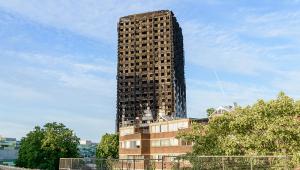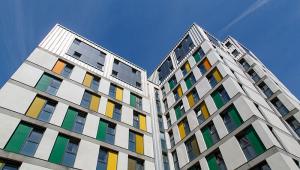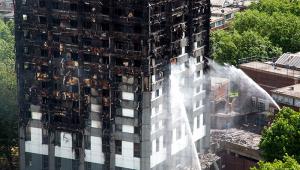Housing secretary James Brokenshire made the announcement yesterday, hours after the release of a government-commissioned independent review, which failed to suggest such a move.
“Having listened carefully to concerns, the government will consult on banning the use of combustible materials in cladding systems on high-rise residential buildings,” he told the Commons.
“I will ensure that there is no room for doubt over what materials can be used safely in cladding of high rise residential buildings.”
Dame Judith Hackitt’s review identified “ignorance” and “indifference” when it came to applying building regulations to putting up cladding on high-rises.
She also said there was a “culture issue”, which she called a ‘race to the bottom’, where organisations were more concerned with costs than ensuring “that residents are safe, and feel safe”.
She called for a “culture change” and a new regulatory framework to encourage the “right behaviours”.
“This is most definitely not just a question of the specification of cladding systems, but of an industry that has not reflected and learned for itself,” the review said.
The review was commissioned following the fatal Grenfell Tower fire in June last year, in which 71 people lost their lives. Although, Hackitt has since been quoted saying her remit was not to look at the details of the fire itself.
Brokenshire also told the Commons: “The cladding believed to be on Grenfell Tower was unlawful under existing building regulations. It should not have been used.”
Lord Porter, chair of the Local Government Association, responding to the announcement on the consultation, said “it’s great that the secretary of state has listened to our concerns”.
He called for the government to act “without delay to introduce a temporary ban on the use of combustible materials on complex and high-rise buildings and until we have a regulatory and testing system which is fit for the 21st century.”
Clive Betts, chair of the housing, communities and local government committee, said: “While the independent review has come to many sensible conclusions, I strongly regret Dame Judith’s decision not to recommend an immediate ban on the use of combustible materials in the cladding of high-rise residential buildings.”
Polly Neate, chief executive of Shelter, said the Hackitt Review had “ducked a huge challenge by failing to ban combustible cladding outright”.
She said the housing charity was “deeply concerned that of the 189 social housing blocks with Grenfell-style cladding less than 4% have had their cladding entirely replaced, leaving thousands of people anxious, uncertain and unable to sleep soundly at night”.
Labour’s shadow housing secretary John Healey said: “Almost a year on from the Grenfell Tower fire, over 300 other tower blocks have dangerous, Grenfell-type cladding, but only seven have had it replaced.”
The review came a day after prime minister Theresa May committed to spending £400m to support the removal of unsafe cladding from buildings by councils and housing associations.
The prime minister told the Commons: “I can confirm that the government will fully fund the removal and replacement of dangerous cladding by councils and housing associations, estimated a £400m.”
In January, 36 councils said they had failed to receive funding to install fire safety equipment.
Recommendations in the Hackitt review include:
- An outcomes-based approach to the regulatory framework to be overseen by a new regulator that can drive the right behaviours
- Clearer roles and responsibilities throughout the design and construction process and during occupation
- Residents to be consulted and involved in decisions affecting the safety of their home
- A more rigorous and transparent product testing regime and a more responsible marketing regime
- Industry to lead on strengthening competence of all those involved in building work and to establish an oversight body.











